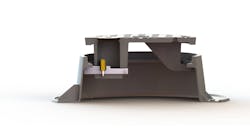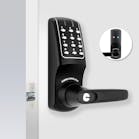Every locksmith who owns their own business wants to grow that business. But as it starts to grow, a question inevitably must be asked: Who will do all the work?
If the answer is “me,” that’s probably the wrong answer. The industry is littered with tales of locksmiths who work 70-hour weeks, because they can’t say no to any job. That works for only so long before burnout settles in.
The correct answer, of course, is you and additional staff that you hire — employees. This was the topic of the latest meeting of Locksmiths United, led by Wayne Winton, in which a broad range of issues that pertain to employment were discussed including:
- When to hire
- Who to hire
- How to hire
- How to benefit from your hires
Getting Them in the Door
Winton was joined by #LockBoss PJ Slauson, CEO of CLK Supplies, Aero Lock and Country Lock & Key. Slauson estimates he has about two dozen employees—strike that—two dozen “staff members.” Winton said he didn’t like the term “employee,” and Slauson responded, “I completely agree. ‘Employee’ has more of a negative connotation.” An employee is someone who isn’t invested in the company, he says, and won’t help to maximize your business.
“People are going to apply to work for you for money, but money won’t keep anyone in any position,” he adds.
When it comes to looking for staff members, Slauson and Winton were in further agreement: Don’t do it when you’re overwhelmed from working those 70-hour weeks. Searching for prospective candidates at that point means that you’re approaching the task from a position of desperation, not strength, Winton says, and it could lead to a bad outcome. Keep in mind that not only do you have to find the time and salary to add another worker, but you also have to find the time to train that person until they become valuable.
Instead, the time to look for workers is ahead of the curve. Winton advises adding an application button to your company website. That allows applications to accumulate over time and build a field of potential candidates.
“Now I have a pool to dip from, and I’m not in emergency mode,” he says. This allows him to allot time for screening ahead of any crunch because of increased work from new business or the departure of another worker. “When the time comes, I can go to [candidates] and ask, ‘are you still interested?’”
And the candidates might come from surprising directions. Winton mentions lock hobbyists who might be interested in becoming a professional. Slauson adds that his businesses attract people who were auto mechanics and participants in locksport. He frequently finds people just from casual conversation.
“The Number 1 industry I get candidates from is IT, computers,” Slauson says, which is noteworthy given the security industry’s ongoing move to electronic access control.
Getting the Most Out of Them
If possible, Winton recommends having another person — an existing team member — do a preliminary screening interview to cull the pile of applicants as a big time-saver. If the candidate passes the screen, Winton will step in and conduct further interviews, including what he called “a working interview.” In this, he will hand over a lock, show the candidate how to fix it and then ask them to repeat the steps. If they can’t, that’s a sign the candidate could struggle.
Training, of course, is an important consideration, and Winton says he shows new hires the difficult way to accomplish a job before then showing them the easy way. He uses the example of picking a lock by using standard tools before showing the new hire how to do it by using a Lishi tool.
“Knowing how to do it the hard way makes [them] appreciate the easy way,” he says.
But it’s also important to set up team members with the best equipment for the job, whether that’s the right Lishi tool, or a work truck that has air conditioning and a fresh set of tires on it. The trick is to treat them as you would treat yourself to produce the best results.
“Make sure you’re equipping them to win, with the same tools you use and the same van you would use and set them up like you value them,” Slauson says. “No one wants a van without AC. No one wants a key machine that doesn’t quite work.”
And, of course, you have to incentivize them to want to succeed. Slauson says most workers stay at a job between 2.8 and 4.1 years. His goal is to “beat the odds.” How he tries to accomplish that is by encouraging, or “stacking” little improvements that build over time. Another way is an incentive program that leads to bonuses, as well as solid benefits, such as paid lunch and flexible schedules. “It’s a strategy of little perks that people value,” he says.
Winton and Slauson said the use of company meetings to discuss issues, including training and performance, is essential.
“Keep innovating in your company, and let people know the direction they’re headed,” Slauson says.
As for yourself and getting out of the “overwhelmed” hole? Learn the right way to say “no” to a job — by not saying it. Instead, Winton says, he’ll make the service price for typically unprofitable extra work “stupid expensive.” If the customer is willing to pay it, fine. If not, no big deal.
“When I say, ‘no,’ the customer has a negative experience and might take it to Google,” he says. “But, if I say, ‘here’s my price. If you want to get it done, we can do it.’ They can make a choice on their own.”
Go here for a full video of the presentation.
Locksmiths United
Locksmiths United is a monthly Zoom presentation to discuss locksmithing and provide information to others in the industry. The meeting is scheduled for 7 p.m. ET, the first Monday of each month. The next meeting is scheduled for June 6, 2022. The preliminary topic is inventory. All locksmiths are invited. Contact Winton via Locksmith Nation’s group page on Facebook for the Zoom link.
Will Christensen | Senior Editor
Will Christensen is senior editor at Locksmith Ledger International. He has been an editor and reporter at magazines and newspapers for more than 30 years.






